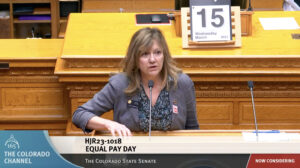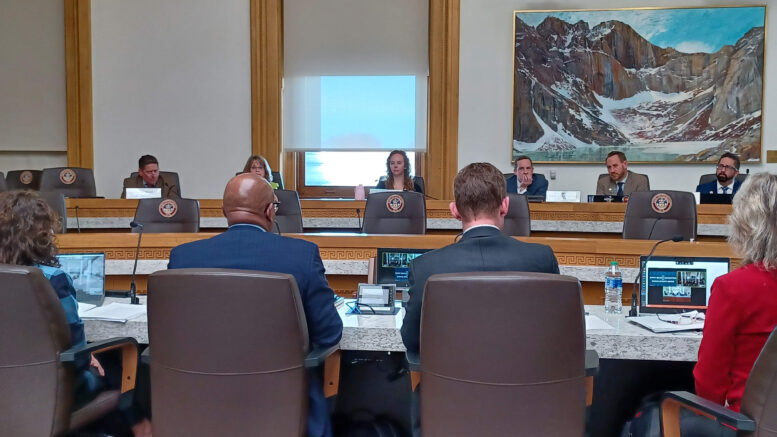After more than a month of hearings and discussions about rising utility rates, legislative Democrats introduced a bill to require greater justification for future rate hikes and push utilities to move away from natural-gas infrastructure, saying it will improve transparency and accountability.
Officials from the state’s two investor-owned utilities said Wednesday, however, that the provisions of Senate Bill 291 not only will do nothing to halt rising utility rates but could increase rates by raising utilities’ financial risk levels and lowering their credit ratings. And several requirements, Xcel Energy and Black Hills Energy officials argued, could boost the cost of new homes at a time when Gov. Jared Polis is seeking to quell Colorado’s affordable-housing crisis.
The bill, sponsored by Senate President Steve Fenberg of Boulder and Democratic Sen. Lisa Cutter of Morrison, is moving quickly as the legislative session enters its final weeks before its May 8 adjournment. Introduced late Tuesday, SB 291 is set to have its first hearing Thursday morning before the Senate Finance Committee.
Following natural-gas price hikes of 75% this winter, legislative leaders organized a Joint Select Committee on Rising Utility Rates, which questioned regulators, utilities, and utility watchdogs over three meetings about what could be done to avoid such price volatility in the future. While Xcel and Black Hills leaders requested that they be able to store more natural gas and to price products over longer-term contracts to allow them to spread out rate hikes, watchdog groups suggested solutions such as barring them from passing along 100% of gas cost hikes.
Provisions of the bill
SB 291 does not incorporate requests from the utilities but works in a bevy of solutions proposed by others who spoke to the committee. And it incorporates several suggestions to move utilities away from installing and charging all customers for long-term natural-gas infrastructure, which was a particular push of Fenberg’s during hearings.

Black Hills Energy workers install a natural-gas pipeline.
The bill, for example, would bar utilities from providing line-extension allowances, which are incentives offered to owners of new homes to get natural-gas pipelines hooked into their residences. It also requires the Public Utilities Commission to conduct a study on whether extension of natural-gas lines to new developments in certain geographic areas impact costs for income-qualified customers with existing service – and whether the costs for that extension should be borne by specific customers.
SB 291 also requires the PUC by 2025 to establish a mechanism that creates incentives for investor-owned utilities to improve production cost efficiency while minimizing fuel costs, including a potential requirement for them to bear a percentage of fuel-cost increases. For some 50 years now, utilities have been able to pass 100% of fuel-cost increases along to customers, which has led to significant spikes in times like this winter when natural-gas prices soared worldwide.
The bill also would require more documentation from utilities seeking rate or price increases and allows the PUC to limit utilities’ ability to recover some costs from customers, such as legal and consulting fees for experts helping them set proposed rates. And it bars utilities from trying to recover costs from customers for a number of services, including advertising expenses, lobbying costs and investor-relations expenses such as payments to board members.
“Hold utilities more accountable”
Lastly, SB 291 requires the Colorado Energy Office to study the potential effect of speeding depreciation of natural-gas infrastructure that now depreciates typically on a schedule of 40 to 50 years. And it requires the PUC to commission a study on whether existing policies pose a barrier to the electrification of buildings.
Fenberg said in a news release that after the price volatility of the past winter that affected so many Coloradans, he believes the measures in SB 291 will “improve transparency and hold utilities more accountable to the ratepayers they serve.” He and the other three Democrats that served on the six-person special committee said they incorporated learnings from the hearings into the proposal.

Colorado state Sen. Lisa Cutter speaks on the Senate floor earlier this session.
“One thing quickly became clear: Coloradans are bearing the brunt of volatile rate increases while utility companies are empowered to set their own rules,” Cutter added in the release. “This important legislation will help level the playing field at the PUC and create fairer processes in utility rate-setting that will impact Coloradans today and for generations to come.”
Utility leaders, however, said that the proposal, if passed, could have the opposite impacts on prices that the sponsors are seeking.
Could utility rates rise?
Several provisions will add financial risk to utilities, including the potential rule requiring cost-sharing of fuels, the disallowance of incorporating legal fees into rates and the ban on receiving reimbursement for costs like advertising, said Nick Wagner, vice president of Colorado regulatory affairs and policy for Black Hills. Because of the increased risk, credit-rating agencies are likely to lower ratings and increase interest rates on debt sales for the utilities, which will in turn raise the cost of infrastructure projects that will be passed onto customers, he said.
Banning line-extension allowances and studying whether the costs of connecting natural-gas infrastructure to new developments should be borne by those new developments, meanwhile, will increase the cost of new homes, said Robert Kenney, Xcel Energy Colorado president. Such policies also subvert the will of homeowners who want to hook up to natural gas rather than electrify their homes and expect they won’t have to pay more than other customers, he said.
Effect on home prices?

Robert Kenney is president of Xcel Energy Colorado
“That one is less burdensome to us and more burdensome to developers,” Kenney said. “It would necessarily raise the cost of building houses when we could least afford to make housing more expensive.”
The provision to consider the speeding of depreciation based on declining numbers of gas customers or projected drops in gas sales also would shift costs of infrastructure toward utilities and possibly boost rates needed to repay them, Wagner said.
Kenney added that the bill seems to ignore efforts that utilities already are taking to cut costs to customers, such as the 58% cumulative decline in gas costs Xcel has had in the past few months and the fourfold growth in assistance it’s offered to fixed-income customers.
“We remain ready and willing to work collaboratively to come up with creative solutions that would have a meaningful impact on affordability,” Kenney said. “I’m not sure we’re there yet with this bill.”
